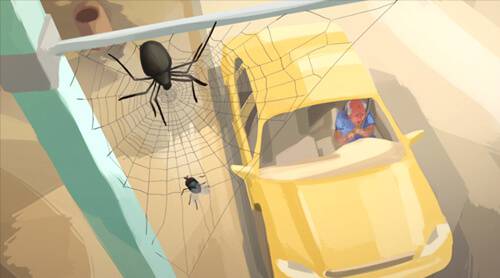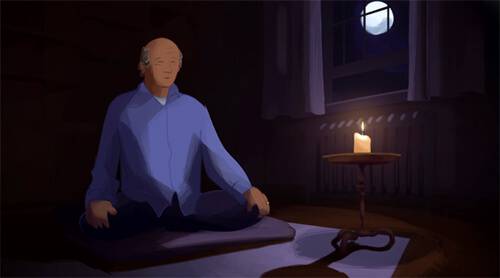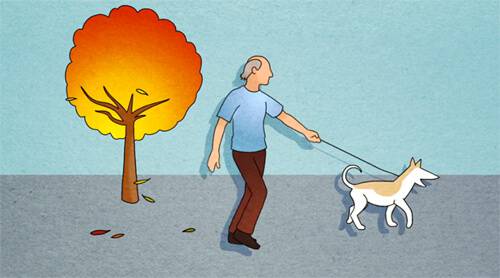A Conversation with Sheldon Cohen (‘My Heart Attack’, ‘The Sweater’)
This year sees Sheldon Cohen‘s unexpected return to animated shorts with his latest film My Heart Attack. Known for such work as the BAFTA-winning NFB production The Sweater (1980), adapted from Roch Carrier’s classic of Canadian childrens’ literature, as well as Snow Cat (1998), Pies (2004) and the multi-award-winning 2002 short I Want A Dog, Sheldon’s new film is his first to draw upon his own real-life experiences, recounting the events leading up to his heart attack and its rocky aftermath. Screening at this year’s Ottawa International Animation Festival among others, My Heart Attack effectively combines humour, pathos and compelling visual representations of the fears and anxieties that accompany such journeys into the unknown.
My Heart Attack, as the title indicates, is based on a major life event. At what point did you realise this story would become an animated film?
At the time I never thought it would be an animated film, although right from the start I had the story in me to tell. In general what happened was that within two years it went from a simple development into a major production, so it all happened relatively quickly when you think about it. It’s quite amazing to me that it all unfolded this way, everything just came out of the blue, the heart attack and even coming back to animation. I had kind of turned my back a little bit on animation in a sense. So you never know where life is gonna bring you, it’s almost like in a way life told me ‘Not so fast, there’s at least one more film you can do’.
Would you have ever planned on making such a personal film otherwise?
My films always relied on other authors, using their stories and adapting them kind of became my specialty, starting with Roch Carrier’s The Sweater in 1980. I never even thought – or had to confidence to think – that I could tell my own story, so it kind of forced me into a different route as a filmmaker. At the time of the heart attack I was writing what you could call a memoir about my experience with filmmaking, so writing was actually on my mind at the time as something that I was really enjoying. So there was a bit of a natural evolution that, when the film project did happen, aside from being the director I could also be the actual author of the story. I ended up actually being the narrator, which was also a real stretch for me. I would never hire myself as an actor, so I just really had to get comfortable to actually sit in front of a microphone and start recording – it would’ve taken a normal actor two hours in a booth, but it took me literally two summers to get the narration out! So in a way there’s something fresh about this film for me, it kept me feeling almost like a kid in school again.
It does have that fantastic painterly style to it, was there a particular software you used to replicate that?
We used TV Paint, but to give credit to the visuals I worked with David Barlow-Krelina, who really took my scribbles and primitive interpretations of this experience that I had put on paper and developed it in a digital way. When I actually got the green light I totally panicked and had no idea how to make this film, it just threw me. My usual style is outlining with flat fills, very primitive, but I knew in this film I really wanted a source of light that I don’t get in my normal artwork, so my producer Marcy Page suggested I discuss the visuals a little bit with David. And it just clicked in terms of what he could do, it’s just a gift he has, what would take me weeks to do he would do in an afternoon!
At that point I really feel it sort of stopped being just my film and so I really do want to give him the credit. The credit he has officially is Art Director, but it’s almost like co-director. Then there was an amazing animation team, again because I was so limited in my technical abilities. It’s amazing that now everything is just on this tablet, from rough drawings and storyboard to images, animation, editing, incorporating music, it’s just all there and it allows you just to try so many different things very quickly which changes the process of filmmaking and is quite incredible to me.
There’s a nice mix of visual styles as well, such as the infographic segments when discussing some of the technical health issues…
That could have worked both ways because if it didn’t come together it would’ve been a disaster. I don’t like to use rules, like anything ‘should’ be a certain way, for me whatever gets it out there and tells the story in the right way is what’s necessary. The bottom line is that you’re keeping the audience in a certain rhythm of storytelling, no matter what it takes.
And certain abstract visuals as well, as it gets quite intense towards the end.
Yeah, exactly, it really shifts gears mid-way. Even when I watch it now I’m kind of surprised that I’m suddenly in a different place. I felt I wasn’t prepared at all for when I got home of what awaited me. They do the surgery and they actually save your life but what happened afterward just totally threw me. I think a lot of it is because this particular surgery is so invasive when you think about it, it goes into the core of your being, they actually reach into your heart and start manipulating it. So I’m sure on some level, even though you’re totally under, the body remembers, there’s something in your psyche that just holds on to the trauma of it. And that’s why animation is so interesting for me, to use as a medium, because it’s really feelings that go beyond normal expression. So those abstract images that you see are ways for me to try to convey what I felt, and I’m hoping this film actually, for people facing this kind of thing, will allow some kind of understanding or preparation for it.
I think also it’s important to keep the elements of levity throughout, even though towards the end it goes on a more serious journey. The last line and the accompanying visual is a very positive note to end on.
It’s interesting about the ending, we had different ideas of how everything would end. It was way more jubilant, kind of a choir, gospel singing, just totally over-the-top, which the eventual ending is kind of the opposite of. There’s so many changes that happen through the production, halfway through my producer, Marcy Page (there’s just no-one quite like her, she’s just totally amazing as a producer) retired and I was kind of spinning my wheels in terms of what would happen next. Then Jelena Popović came on board as producer, so it was actually with her that we worked out the ending that you see. So I give her credit to for leading me in that direction. And then there’s the McGarrigle Sisters’ song, they’re like music royalty here in Canada, so that final song came also at the very end which, for me, just brings together the emotions of the whole experience in a way. Without getting too corny it’s really about love, in a way, that in the end all this leads to appreciating life and people that you’re with. Anyway, it’s a tricky film because it’s a combination of the humour and the very profound, finding the balance where you can appreciate both of it.
My Heart Attack screens today (repeated September 20th) at the Ottawa International Animation Festival, with other upcoming screenings including the Atlantic Film Festival and Animatou. You can hear more from Sheldon Cohen in a future episode of the Skwigly Podcast. In the meantime to follow his work and the journey of the film visit bysheldoncohen.blogspot.com




